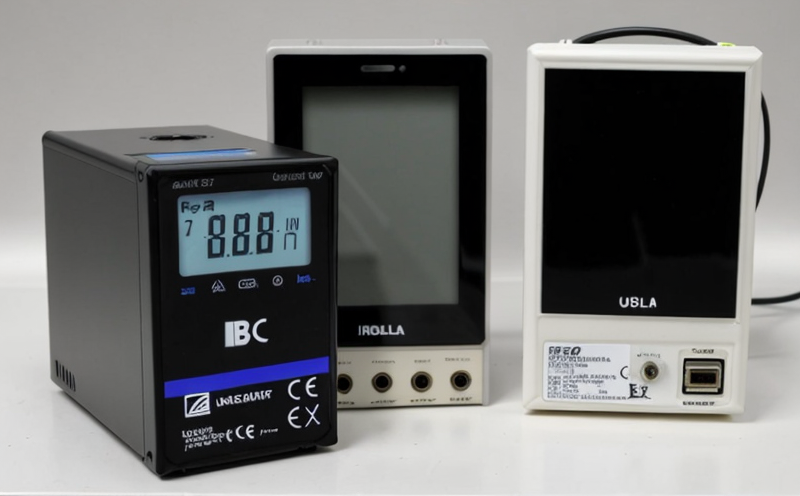EN 62619 Consumer Electronics Industrial Lithium Battery Testing for Devices
The Battery Testing sector encompasses a wide range of services aimed at ensuring the safety, performance, and reliability of batteries used in various applications. One such critical service is the testing of industrial lithium batteries for consumer electronics devices as per the international standard EN 62619:2013.
The standard covers the technical requirements for the design, manufacture, and performance evaluation of lithium-ion cells intended for use in portable electronic products like smartphones, laptops, tablets, and other consumer electronics. This service is particularly important given the growing demand for smaller, more powerful batteries that are both safe and environmentally friendly.
Compliance with EN 62619 ensures that manufacturers can meet regulatory requirements while also improving product quality and reducing risks associated with battery failures. Testing covers various aspects including electrical safety, thermal stability, mechanical integrity, durability under different environmental conditions, and more. Let's delve deeper into why this service matters.
Firstly, consumer electronics are expected to perform consistently across diverse environments worldwide. Manufacturers must ensure their products meet stringent safety standards set by international bodies like the International Electrotechnical Commission (IEC) and Underwriters Laboratories (UL). Secondly, lithium batteries have unique characteristics that require specialized testing methods not applicable to other battery types.
For instance, lithium-ion cells are highly reactive with certain chemicals and can overheat or even catch fire under specific conditions. Therefore, thorough thermal analysis is essential for identifying potential hazards early in the development process. Similarly, mechanical stress tests help assess how well batteries withstand shocks, vibrations, and other physical stresses encountered during everyday use.
Another crucial aspect of this service involves ensuring that batteries deliver consistent performance over time—a challenge exacerbated by rapid advancements in technology. By simulating real-world operating conditions through accelerated aging tests, laboratories can predict long-term behavior accurately. Additionally, compatibility checks between the battery and its host device ensure seamless integration without compromising either component's integrity.
To summarize, compliance with EN 62619 is vital for several reasons:
- Ensures adherence to global safety regulations
- Promotes reliability and longevity of products
- Reduces risks associated with battery failures or explosions
- Facilitates easier market entry into different regions
- Improves overall product quality through rigorous testing protocols
The next section will explore why meeting these standards is essential for businesses operating in the consumer electronics industry.
Why It Matters
Meeting EN 62619 requirements is crucial because it helps companies stay ahead of regulatory changes and competitive pressures. In today’s fast-paced tech landscape, staying compliant not only protects your brand reputation but also ensures you avoid costly fines or recalls. Here are some reasons why compliance matters:
Firstly, regulatory bodies like the European Union mandate certain safety standards for lithium batteries to prevent fires and explosions. Failure to comply can result in product bans or forced withdrawals from markets. Secondly, customers increasingly prioritize safety when purchasing electronics. By demonstrating commitment to rigorous testing processes, you enhance consumer trust and loyalty.
Moreover, adhering to these standards sets your company apart by showcasing expertise and reliability. It signals to potential partners and investors that your organization takes quality seriously. Lastly, compliance reduces liability risks associated with product defects or failures during use.
Given the complexity of lithium batteries and their role in various consumer electronics devices, ensuring proper testing is paramount. This section has provided insight into why compliance matters; now let’s look at some specific standards applied to this service.
Applied Standards
| Standard Name | Description |
|---|---|
| EN 62619:2013 | This standard specifies the electrical safety, thermal stability, mechanical integrity, and durability requirements for lithium-ion cells used in portable electronic products. It ensures that these batteries meet global safety regulations. |
| IEC 62133 | International standard covering the safety of rechargeable small battery-powered equipment, including lithium-ion cells and batteries used in consumer electronics. It addresses hazards such as thermal runaway and provides guidelines for safe design practices. |
These standards play a pivotal role in ensuring that industrial lithium batteries for devices meet the highest safety and performance benchmarks. Compliance with these regulations not only protects users but also enhances product reputation and market competitiveness.
Competitive Advantage and Market Impact
- Innovation Leadership: By staying ahead of regulatory changes, companies can introduce innovative products more quickly to the market. This agility allows them to capture early adopter segments and establish a strong foothold before competitors.
- Enhanced Safety Reputation: Demonstrating commitment to safety through rigorous testing enhances brand image among consumers who prioritize product reliability.
- Avoidance of Legal Issues: Compliance minimizes the risk of legal disputes related to non-compliance, thereby protecting companies from potential lawsuits or regulatory penalties.
Meeting EN 62619 standards provides significant competitive advantages by ensuring that products are safe, reliable, and perform consistently across various environments. This consistency fosters trust among customers and partners while differentiating the brand in a crowded market space.





